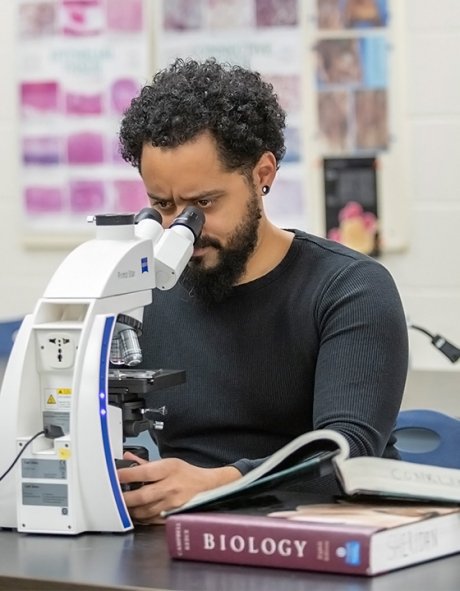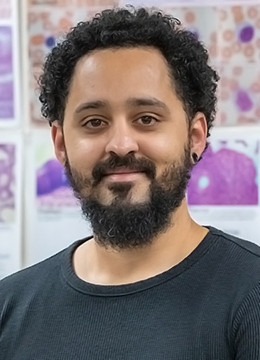MEET OUR GRADUATES: After 10 Years in a Heavy Metal Band, Andre is Now the Pride of the Biology Dept.
- News & Events
- News
- MEET OUR GRADUATES: After 10 Years in a Heavy Metal Band, Andre is Now the Pride of the Biology Dept.

“All the experiences I gained outside of school helped me when I went back to school,” says Gomes. “The creativity, innovation and attention to detail you find in music all translate over to science.”

Thirty-five-year-old Andre Gomes will be graduating this May with departmental honors in biology and a slew of other grants and awards. He is a recipient of the Joseph L. and Norma A. DiLibero Endowed Scholarship for research, the W. Christina Carlson Award for exceptional potential in research and the Summer Undergraduate Research Fellowship.
After 10 years playing in a local heavy metal band before screaming fans, Gomes is now looking at a future career in biology. According to Gomes, it was the science of biomimicry that lured him back to college.
“I first enrolled at RIC right after high school,” he says, “but I didn’t know what I wanted to do, so I dropped out after two years to follow my passion – music.” His band, Deathwish, was formed by his best friend and a few members of his evangelical church’s high school. They toured New England, released their own CDs and sold shirts and other merch.
“I wanted it to be my career,” he says. “But by age 27, I thought, ‘I’m not making a lot of money. If I can’t make it in music, I need to find something I feel passionate about in a similar way.’ That “something” turned out to be biomimicry.
Gomes was fascinated by biomimicry. Biomimicry uses nature as a model to solve human problems. “It could be as simple as how we model planes after birds,” he says. “Scientists also studied shark scales and saw that the scales were structured in a certain way so that bacteria couldn’t grow on them. From that, a company called Sharklet® designed shark-skin-inspired material for use in hospitals to ward off bacteria. I came back to school to do biotech.”
After earning his associate degree at CCRI, Gomes transferred to RIC. After earning an ‘A’ in an intro to biology class with RIC Professor Daniel Hewins, he was invited by Hewins to do research in his lab.
“Obviously, I was really honored,” Gomes says. But what he didn’t know was how much it would change his life. Though he is still open to a career in biomimicry, he would now like to combine biomimicry with the biogeochemical research he’s done with Hewins.
““Dr. Hewins does environmental science,” Gomes explains. “In the lab, we test soil and leaf litter samples from a site that has both a clear-cutting area [a destructive/disruptive logging practice] and an untouched, old forest area. We’re comparing the chemistry of the soil in the clear-cutting area with the old forest area to see if there’s a difference in the rate of decomposition of the leaf litter and carbon storage in the soil. We’re particularly looking at carbon sinks – areas that take in more carbon from the atmosphere than it releases, which is a great way to fight climate change.”
Gomes based his departmental honors thesis on his research, which will be incorporated into a larger publication that Hewins and retired Professor of Biology Roland de Gouvenain are writing. “Being a co-author is really cool,” Gomes said.
The senior is also vice president of the Biology Club and even pulled out his guitar to help out the student-run Environmental Club.
“The Environmental Club held a tea tasting in the RIC Greenhouse and I got to play some chill, jazzy, acoustic stuff,” he says. “I’m trying to get involved in everything I can this time around in college and make the best of it, you know.”
A well-rounded student, athlete and artist, there’s still a good amount of music being made and recorded by Gomes. In reality, he says, music is not that different from science.
“The creativity, innovation and attention to detail you find in music all translate over to science,” says Gomes. “There are, of course, certain rules in science that you have to follow called the scientific method. When you make a hypothesis, you first have to test it to be sure it’s actually legit. But there’s a lot of creativity when it comes to designing an experiment.”
“I think you have to be curious and you have to have an imagination to be good at science,” he says. “You have to be able to see things that maybe other people aren’t looking at and look at things in a different way. It was the creativity in science that made me want to go back to school and major in biology.”
Gomes highly recommends that students get involved in scientific research. “It isn’t something you have to do to graduate, but there are many benefits,” he says. “The faculty you work with have contacts and can connect you to jobs. I’ve applied for an environmental lab job that Dr. Hewins referred me to. There are also opportunities for awards and scholarship, and doing an honors thesis really makes me an attractive candidate for grad school. Then there’s the students I’ve met in the lab. I’ve made real friends. You wouldn’t expect to make friends as an older student because the other students are so much younger, but when you’re in a lab with the same two students for years, you get close.”
Ultimately, it was worth going back to school, he says. “Here I am a Cape Verdean guy from Pawtucket. There’s no one in my immediate family who is into science and technology. I feel like I’ve changed the trajectory of my life, and, hopefully, my family’s life, too.”
Find out more about the Department of Biology and biology research at RIC.
